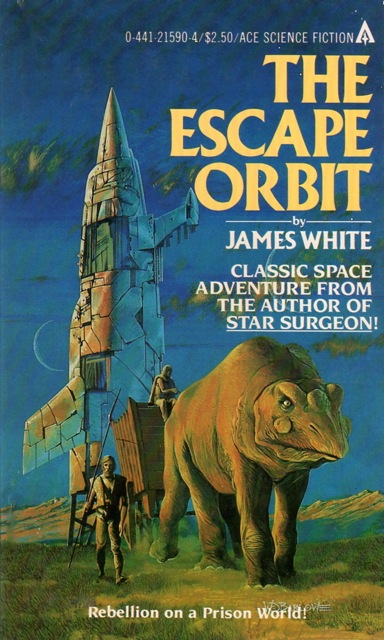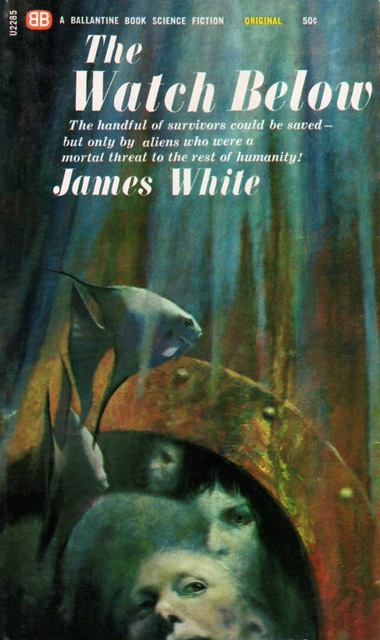
ACE 1983 edition; cover art Wayne Barlowe
The Escape Orbit by James White (1928 – 1999) was first published in 1964 as Open Prison. The next year the variant The Escape Orbit was released with the fancy Jack Gaughan cover art. I read the 1983 edition with Wayne Barlowe’s cover art. This is the fifth book by James White that I have read. Two of the five have been part of White’s Sector General series. White’s works have run the gamut as far as my ratings. This novel was nominated in 1965 for a Nebula Award….. and so was Clifford D. Simak’s All Flesh is Grass, PKD’s Dr. Bloodmoney, and Frank Herbert’s Dune. Obviously, White’s work did not win. But it seems that those 1964-1966 years were really something for science fiction and some great things were written/published.
I decided after reading this novel that it is a five star novel. At the end of the day, ratings are mostly subjective. Those novels that I think are five stars, others may hotly contest that they even deserve three stars! It is what it is. I think that it being my blog, the rating should reflect my readings/opinions. I do try to make the case for five star novels being rated so – I do not just say ‘oh, I liked it a lot’ and leave it at that. And then, perhaps, my tastes or criteria have adjusted in the years since I read a work; not making my rating of a book invalid, but heavily locating it in a definite time/place. Further, I think it is important to remind readers that a five star rating does not mean that I think the novel is perfect. I actually do not think there are “perfect” novels.
The Escape Orbit is not a book that I expected was going to be given high marks when I started reading it. I knew it had some good potential and that White is a decent author. The one element that I think continually convinced me of the five star rating was the unanticipated amount of effort that the author put into this novel. My copy is 184 pages and I feel like it contains more of the author’s blood, sweat, and tears (so to speak) than many of the 364 page novels published nowadays. I mean it – several times during my reading I was caught like this, ‘Oh wow, yeah, I hadn’t thought of that’ or ‘yeah, that makes sense, great workaround!’
White knew he was writing a novel in which he might also be accused of helping the characters a bit too much with the problems they faced. White did respond to this:
“It was a simple, daring plan which at practically every stage was packed with things that could go wrong…. it would be workable with just the average amount of good luck instead of a multiple chain of miracles.” – pg. 39, chapter five
The book is fiction and while it attempts to be quite realistic, let us say, we all know we are going to allow a lot of leeway for the characters to get what they need in service of the plot. So, sure, at points White knew readers might think he handed the characters some easy fixes. However, it was not done utterly unknowingly and there were plenty of struggles so that the characters did not get handed chains of miracles (a phrasing that is tickling me).
There has been a long, long running interstellar war between humans and the “Bugs.” Both sides are worn thin from the war effort and the war was never total war, so to speak. White details some of this at the start of chapter two so that the reader can get a grasp of something near a century of warfare between the species. The keeping of prisoners, on both sides, has become an issue. There is no need to slaughter prisoners, but at the same time, supporting the number of prisoners in a “humane” fashion is also untenable. So, the Bugs, at least, have found envirnomentally human-friendly planets and they drop humans prisoners (military) off on this planet to fend for themselves. Thus, a prison planet.
We join the story with the survivors of the warship Victorious being dropped off on the planet. Among them is our main character, Sector Marshal Warren, who turns out to be the highest-ranking prisoner on the planet. It is somewhat impressive that James White, himself, was not (as far as I know) in the military because from the books of his that I have read, he does display a decent working knowledge of aspects of the military. That is to say, he writes very convincingly and his characters are reasonably created.
Overall, the story is one of survival, escape, and leadership. In one sense, this can be a rather dull story – it is completely full of nothing more than problem-solving and maybe that gives it the somewhat slower-feeling pacing. However, actually considered, there are plenty of character-tensions, action scenes, and plot twists. Its good writing, believe it or not, and maybe I did not even realize that until late in the novel. It feels slow-moving at times, but there is a lot going on, I think. And its only 184 pages! I am still surprised by how much happened in the book compared to its length.
Warren had wondered briefly how it was possible to both like and dislike what he was doing, and the people who were helping him do it, intensely at one and the same time. – pg 121, chapter fourteen
This book, after all, is all from Warren’s point of view, although it is not exactly fair-play in the sense that Warren plays his cards close, if you will, and never fully reveals all of his decisions to the other characters or to us readers. However, it does not feel deceitful or contrived because Warren himself lets us all know that he is playing it close and he knows it has to be that way and it may frustrate others.
Right up until the very last page readers are, I would think, torn between whether each character is a good guy or a bad guy. Because, truly, most novels have good and bad. This novel is realistic because the characters are dynamic and their motivations and insights are reasonable – and typically human. Right up until the last page, readers may still be wondering about Warren’s motives and morality. Keeping readers off-balance so they are not sure what side they are on is a tough feat. It resembles some of those other excellent novels of the time period that were nominated for awards. That’s some very strong writing skill.
The amount of strategy and planning and devising in the book is quite impressive. I do not want to simply say it is a study of leadership and strategy, because this makes it seem like the book is something it is not. This is still a novel, which at times is nearly pastoral and ruminative. It is not The Art of War or something from Tacitus. Readers wanting a pulpy adventure story of a prison planet will be very disappointed. Similarly, readers wanting hard science fiction in which the characters are just barely names and ranks will also be frustrated. Instead, White wrote a very human novel about humans in a difficult situation being constantly confronted with problems to solve – including the main one: the rôle of goals in human activity/psychology.
There are a lot of ethics/pyschology concepts for an intelligent reader to wrangle with here. At the heart of it, this is not fluffy. If a reader does not come away questioning or wondering as they read through the chapters, they are doing it wrong.
This is not a difficult read, but it is not something to blaze through on the beach. I am impressed with it and I do recognize it is not a perfect novel (whatever that could be). I am really glad I read it – it was not what I expected and I can say afterwards that it was definitely worth reading. This is for thoughtful readers and fans of vintage science fiction. If a reader is going to read about the prison planet setting, this one is necessary.
5 stars

 The Secret Visitors is James White’s first novel, published in 1957. I read the darling ACE edition that has tiny font that hurts my eyes. Cover by Schinella (???). However, it should be noted that it was originally (at least parts of it) serialized in 1956’s New Worlds Science Fiction publications. This is significant because I am allowing for the storyline to have been originally meant as a serialized work, digested in segments, and perhaps mauled a bit when put into novel format. And it is White’s first novel. (Another attempt at presenting mitigation.) Because, folks, this one is a stinker.
The Secret Visitors is James White’s first novel, published in 1957. I read the darling ACE edition that has tiny font that hurts my eyes. Cover by Schinella (???). However, it should be noted that it was originally (at least parts of it) serialized in 1956’s New Worlds Science Fiction publications. This is significant because I am allowing for the storyline to have been originally meant as a serialized work, digested in segments, and perhaps mauled a bit when put into novel format. And it is White’s first novel. (Another attempt at presenting mitigation.) Because, folks, this one is a stinker.

